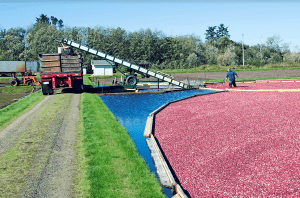
Motors for agricultural applications need to be durable and reliable in the harshest conditions, and the time it takes to install or repair a farm duty motor can be significant. As a result, the initial price point is just one factor when evaluating the overall cost of a motor. Maintenance and upkeep challenges also need to be accounted for within that budget. There are a few guidelines to follow to get the most value out of farm duty motors.
Following an inspection plan of the mechanical systems is one of the most important actions to extend the lifetime of a motor. For example, maintaining mounting and security of the motor and coupling, or sheave or pulley, is crucial for long-term reliability and longevity. A properly mounted motor will alleviate vibration, which can lead to reduced bearing life and premature failure. When mounting the motor, it is crucial that the coupling is correctly aligned to prevent radial loading of the bearings.
If the application calls for belted duty, ensure the sheave is placed as closely to the bearing and end shield of the motor as possible, in order to place much of the radial load on the bearing and not the shaft. Adjust belts correctly with a proper belt-tensioning tool and avoid over tightening belts, which is a major cause of bearing failure. Proper alignment of the sheave to the driven equipment is also necessary for reliability. Always remember that mounting has a major impact on the overall performance and life of the motor and its components.
Making sure the electrical system is inspected and maintained is also important to reliability and extending the motor’s operational lifetime. For example, confirming that the motor is electrically grounded is important, not only from a safety standpoint, but also to ensure that the electrical systems are not experiencing power fluctuations, which adversely stresses electrical components and reduces their operational lifetimes. Checking the terminal box to ensure that the terminal contacts are all attached correctly and securely is also a useful preventive measure. It is key to avoiding abnormal operation, which can adversely affect electrical operation and lead to mechanical wear or outright failure.

Making sure the electrical current is appropriately supplied for the motor is another consideration, as floating grounds or electrical shorts can cause severe damage. It is also helpful to keep a replacement set of capacitors on hand in case the installed capacitors fail. All capacitors malfunction and deteriorate; on-hand spare components can prevent extended downtimes. Keep in mind that when a motor gets hot, the capacitors are usually the first thing to go.
Perhaps the most threatening vulnerability to a farm duty motor is a familiar one: overheating. Like a car engine, keeping operating temperatures low translates to longevity, especially in always-on applications. Overheating stresses the mechanical and electronic systems, and increases the risk of a complete motor failure. If a motor has overheated, complete an inspection of the mechanical and electrical systems once they have cooled. A well-lubricated, cool-running motor will live a long, productive service life.
Farm duty motors are an easily implemented and maintained solution to agricultural applications. High-torque, robust designs are optimally suited for the heavy-duty environments of farming. Reliability, dependability and affordability are the hallmarks of WorldWide Electric Corp.’s farm duty motors.


